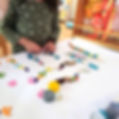ABOUT
Methodology

Today's Preschoolers
As educators, we constantly strive to prepare our students for the ‘real world’ that exists around them.
We want to prepare them to lead productive and successful lives; as well as to grow up to be a mentsch!
But what lies ahead for our students in the future? Did educators of twenty years ago know what skills would be needed in the job market today?
Unlikely, but yet they had to do their best to prepare their students for this world anyhow.
Nowadays, educators are still charged with the same complicated task – preparing students for the unknown!
The 4C's Approach
Experts worldwide acknowledge that today’s children need more than the traditional 3 R’s (reading, writing, and arithmetic) to prepare the children for their future.
Leaders in the field of education are adding the 4C’s. These are the uniquely human skills that must be nurtured in order to thrive in the modern workplace and beyond. With the 4C’s approach, children develop greater capacities for grit, resilience, empathy, altruism and the ability to think and work with others.


Putting it All Together
How can our children succeed at developing the 4C’s?
How can a curriculum maintain a high academic standard but also enrich our children with these lifelong skills?
The 4C’s are already incorporated into the Reggio Emilia Approach to Early Childhood Education as they represent some of its fundamental values.
Reggio Emilia
The Gan is inspired by the Reggio Emilia philosophy. We hope to provide our young learners with a lifelong LOVE for learning, innovation, and thinking out of the box, along with a Judaic curriculum taught in an authentic, hands-on and creative way. It is a project-based approach to early childhood education.
We believe every child is unique, with his/her own interests and learning styles. Rather than limit the child to single forms of expression, we encourage your children to share their learning through art, dance, dialogue or any other means to make their thinking visible.
Therefore, we give children the opportunity to interact in a meaningful environment where they can construct new ideas, learn to think, reason, question, problem-solve, and experiment, as they discover who they are and the world around them.


The Educational Difference
The Traditional Way
Reggio Inspired Way


ABOUT
Reggio Emilia and the 4C’s

Communication
Through encounters with a wide range of media and materials, children become more comfortable and skilled with various materials. They begin to use the materials to communicate or represent their understandings, emotions, discoveries, and interests (“The Hundred Languages”).
We use the Conscious Discipline approach to classroom management to teach children appropriate communication skills necessary to manage themselves, demonstrate assertiveness,
and resolve conflict peacefully.
Collaboration
Groups, both large and small, are encouraged to work together to problem-solve using dialogue, comparisons, negotiations, and other important interpersonal skills. Each child’s voice is heard in order to promote a balance between a sense of belonging to the group and a sense of self.
Dedicated, supportive and loving teachers stand at the cornerstone of The Gan. Our teachers are partners, nurturers, and guides who help facilitate the exploration of topics as the children work on short and long-term projects.
Parental partnership and commitment are crucial to our children’s success. Children blossom when they have their parents’ backing and support.


Critical Thinking
Our teachers and staff set up environments where the children love to learn (The Third Teacher).
This allows the children to experiment, predict and ask questions.
Then the teachers facilitate thoughtful higher order thinking conversations that allows the child to think and delve deeper.
Reggio Emilia and the 4C’s: Creativity
Children are given the opportunity to learn through different artistic forms.
Various materials, tools and equipment are made available to children giving them freedom to explore their potential.
Children then come to fully understand an art medium: how it behaves, how it can be used, how it feels on our bodies and what tools are needed to work with it.


The Focus is on the Process, Not the Product
Learning is about the experience the child is having and not necessarily about what the project looks like.
We use materials that promote creativity, are multisensory and have real meaning for the children.
Product oriented art activities that encourage “copycat” artwork can discourage a child’s individual creativity.
Process art also supports the development and learning of the WHOLE child in all content areas of the curriculum which include:
-
Social and emotional development
-
Cognitive development
-
Physical development
Reggio Emilia: Art
Hands-on activities are REAL, and encourage a lifelong love for learning as well as motivate students to experiment and discover new things.


Reggio Emilia:
Dramatic Play
Children’s knowledge of their world is constructed by hand, by mind, and by heart!
Reggio Emilia: Science
By using hands-on instruction and exploration, children acquire the foundational concepts of scientific discovery.


Jewish Education at
The Gan
We want your children to feel a sense of belonging and pride in their Jewish heritage! We have created a curriculum that weaves academic disciplines, along with Jewish values, into everyday
activities.
Jewish Identity is explored through song, story, art, cooking and movement. Jewish traditions are enriched through additional holiday and Shabbat activities.
"Preschool is time to learn social and emotional skills so you are ready to learn academic skills later on."
- Jenifer Wana,
author of "How to Choose the Best Preschool for Your Child"

